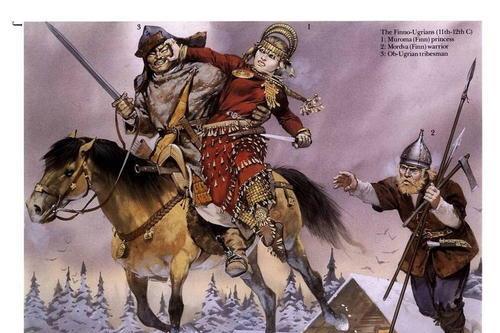The title of God's Whip is easily reminiscent of the name Genghis Khan, because the Mongol Iron Horse he led was invincible, and his descendants relied on their will and superior fighting power to survive the defeat of the most powerful Iron Horse in Europe at that time. But more than a thousand years ago, there was such a person. He was a descendant of the Huns, and he had to lay down a great territory with his own hands. Like Napoleon of France later, the Battle of Waterloo completely destroyed the fighting power of the Hun Empire and soon disappeared on the stage of history, this man was very famous in Europe, almost rewriting the history of Europeans, he was Attila.

?? Attila was a descendant of the Huns, and many people were familiar with the Huns as a nation, and the Xiongnu were crushed during the Two Han Dynasties. As early as the time of Emperor Wu of the Han Dynasty, he sent the great general Wei Qinghuo to the north to fight the Xiongnu and beat them all over the ground. Slowly over time, the Xiongnu split into the Southern Xiongnu and the Northern Xiongnu, the Southern Xiongnu merged with the local Han Chinese, and the Northern Xiongnu did not, slowly developing from north to west and embarking on the journey of Europe. The remnants of the Northern Huns entered the river basin around 160 AD, after which the Huns defeated the Alanites at the junction of Eurasia and Europe.
?? He was born in this context, born in 406 AD, in 418 AD, at the age of 12, and sent to the Roman court as one of the hostages in the Treaty of Peace (at the time of The reign of Emperor Heraldi, the first emperor of the Western Roman Empire). At the same time, the Huns also received Aetius (a general who later commanded the Roman army and successfully resisted Attila's further westward advance) as hostages. At that time, Rome, the first power in the West, was well-deserved, but in the third and fourth centuries, it gradually began to split into the Western Roman Empire and the Eastern Roman Empire.
?? While in Rome, Attila received a good education at the court, where she also learned the traditions and customs of the Romans, as well as their lavish lifestyles. The Romans hoped that this would allow him to spread Roman culture when it was brought back to the Huns, in order to increase Rome's influence on the surrounding peoples. The Huns, on the other hand, hoped that through hostage exchange, they would be able to obtain more intelligence inside Rome. While staying in Rome, Attila tried to escape but failed. So he began to focus on the internal structure of Rome, and focused on the study of Rome's internal affairs and foreign policy. Sometimes, he even studied this information by secretly observing diplomatic conferences held by diplomats. It can be said that everything Attila learned at that time was of great help to his later rule over the Huns, so much so that he was of great help to the conquest of Rome.
By the time Attila was 22 years old, the Hun tribes were unified under ruga's leadership. Two years later, when the leader died, attila was left to rule the Huns with his cousin Breda, but Attila was not a thing. Wanting to monopolize power, it didn't take long to kill his cousin, and from then on the Hun Empire obeyed at the command of Attila alone. Then came Attila's perfect time to expand his territory, first turning his attention to the Byzantine Empire and repeatedly invading the merchant cities on the north bank of the Danube. Attila accused the Byzantines of not fulfilling their treaties, and claimed that the bishop of Magus had desecrated the royal graves of the Huns on the north bank of the Danube and threatened to attack Byzantium again. Attila led the Huns across the Danube, completely destroying the Illyrian region (present-day western Balkans) and Thrace, including the provincial capital, Femirakorn. The Huns attacked all the way to Magus, and while the Huns were negotiating with the Byzantines for the surrender of the bishop, the bishop fled and abandoned the city.
In 443, he again launched a large-scale attack along the Danube River, invaded the military town of Ratia, and besieged Naissu (Nis, a city in present-day Serbia). In these two battles, the Huns used heavy equipment such as siege hammers and siege vehicles for the first time. The Hunn army then swept across the Balkan Peninsula again, along the Nishiva River and captured the major cities of Sherdika (present-day Sofia, bulgaria), Philippolis (present-day Bulgarian city of Plovdiv), Andrrebols (present-day Turkish cities), and finally the Byzantine capital of Constantinople.
At this time Attila's career reached its peak, and soon great ambition and desire to conquer hung over him. After the destruction of the Eastern Roman Empire, only the more powerful Western Roman Empire remained. At this time, he was in full power, and in negotiations with the Western Roman Emperor at that time, he asked for half of the territory to be divided to him, and after being refused, Attila became angry, and the two sides launched the famous Battle of Chalons. Both sides suffered heavy casualties, and what was even more frightening was that the Hunnic army was plagued by the plague, and nearly half of this army died in this plague, which greatly reduced the combat effectiveness of this army. In desperation, I could only retreat, and I once again fell ill and died at the wedding banquet!
Some people say that it was murder, but no matter how attila died, the Hun empire fell into a divided situation and soon committed suicide!